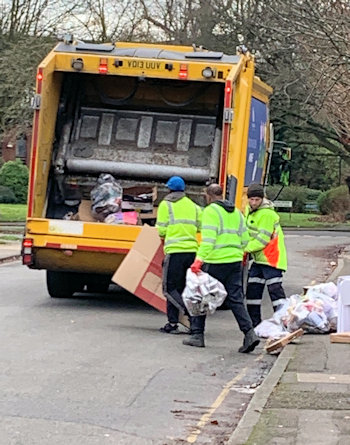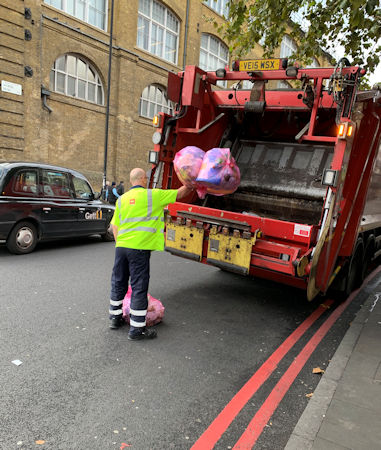Waste management companies have urged the government to classify the industry’s workforce as “key workers” so they can gain access to childcare provision in schools ahead of the national school closures next week.
The sector’s trade body, the Environmental Services Association (ESA), made the key workers plea in light of the coronavirus pandemic as it called on the government to help keep “vital waste services moving, as the closure of schools risks bringing the country to a halt”. And, the association also cautioned that the delivery of waste services is threatened by the virus.
“There is a risk that essential recycling and waste services grind to a halt”
Jacob Hayler
Environmental Services Association
The ESA has called on Government to:
- Ensure frontline recycling and waste industry workers are classified as key workers and can continue to gain access to childcare, so that they can perform their vital roles – this is the ESA’s number one priority.
- Allow some short-term flexibility around planning and permitting conditions to allow services to continue in the event of a reduced workforce, or inability to move recyclable or waste material to its normal destinations.
- Prioritise the sector as a critical industry to ensure the continuation of supplies necessary for it to keep operating, such as fuel.
- Ensure that temporary provision is in place to relieve operators from contractual performance penalties with the local authorities it serves, during this pandemic. For now, the industry must focus on keeping services running, and not on meeting contractual targets.
‘Unprecedented’

Waste sector workers should be given ‘key worker’ status, says the ESA
ESA executive director, Jacob Hayler said: “The current circumstances are unprecedented and with the closure of schools across the country there is a risk that essential recycling and waste services grind to a halt – allowing waste to pile up in our homes and streets.
“Protecting the ability of employees to come to work is our number one priority so we are urgently calling on government to classify frontline recycling and waste operatives as Key Workers, so they can continue to provide the vital services upon which we all rely.
“Our sector also relies heavily on access to fuel, so it is imperative that Government views the recycling and waste management sector as a critical industry so we can keep the wheels turning in the event of any shortage.”
Rules
Mr Hayler went on to say that member companies have concerns around the strict rules around operating waste sites which could force otherwise functioning facilities to close, such as permitted storage levels.
He warned: “For example, it might not be possible to move recyclable or waste material to its normal destination, necessitating temporary storage of this material in larger volumes than would normally be allowed. While ESA members respect these rules and will make every effort to comply with them, we need assurance from Government that temporary unavoidable infractions will not be met with penalties, otherwise essential facilities may have to close.”
Performance criteria
And, the ESA executive director also referenced concerns that performance criteria set in some local authority contracts might not be able to be met and that flexibility would be needed.
He said: “ESA members provide a large proportion of local authority recycling and waste management services across the UK under contract. Normally, operators might incur contractual financial penalties for not meeting agreed performance criteria, such as recycling targets. Our industry needs assurance from Government and local authority partners that any temporary decline in performance measures will not be penalised. ESA members will, of course, continue to provide the best level of service possible, but these are times of crisis and the sector must focus on keeping core services moving – not on meeting targets.”
Normal roles

The association has warned the public not to contaminate recycling with tissues
Talks are continuing between the ESA, the Department for Environment, Food and Rural Affairs and the Environment Agency. And, the association said that Defra has assured the ESA that it is safe for recycling and waste sector workers to continue in their normal roles, as long as they follow correct risk-assessed procedures.
Mr Hayler added: “Our sector is well-versed at keeping its employees safe in respect of workplace hygiene, but it is now more important than ever that frontline recycling and waste workers follow the guidance provided by their respective employers regarding safe waste handling practices.
“While every employer will have its own specific workplace practices, these typically include correctly wearing all of the necessary Personal Protection Equipment (PPE) provided for specific roles; ensuring good personal hygiene practices, particularly in respect of food; and reporting any symptoms of illness promptly.”
Public message
The ESA said in a statement that “the public has been asked by Defra to ensure that any waste produced in a non-medical setting, associated with a person who has symptoms of COVID-19, is double-bagged, tied securely and left inside for at least 72 hours before being placed in the bin, after which time the virus is no longer viable. This is to prevent the transmission of infection and helps protect waste workers.”
And on contamination, the ESA urged the public not to put tissues and other sanitary items in their recycling – “they should be disposed of in the general waste”.
The post ESA seeks ‘key worker’ status for waste sector appeared first on letsrecycle.com.
Source: letsrecycle.com Waste Managment



